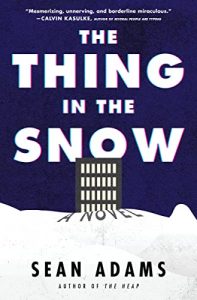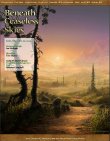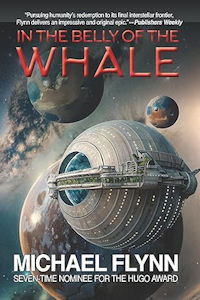Ian Mond Reviews The Thing in the Snow by Sean Adams
 The Thing in the Snow, Sean Adams (Morrow 978-0-06325-775-7, $23.99, 288pp, hc) January 2023.
The Thing in the Snow, Sean Adams (Morrow 978-0-06325-775-7, $23.99, 288pp, hc) January 2023.
Sean Adam’s debut, The Heap, which I reviewed back in 2020, was one of those unforeseen delights that Gary Wolfe talks about on the Coode Street Podcast – a book you weren’t expecting but that turns out to be one of the best things you read that year. It’s the story of the collapse of an architecturally unsound mega high-rise – the folly of an obscenely wealthy developer – and the community that springs up amongst the ruins. As I said in my review, it’s a deeply weird novel with a pulpish aesthetic and a zany sense of humour. Adam’s follow-up, The Thing in the Snow (apart from the snowbound setting, the book bears no relation to Carpenter’s The Thing or Campbell’s short story), is similarly weird and funny and also centres on a structure, though this one is only seven floors high and stays upright for the duration of the story.
The building in question is the Northern Institute, a former research facility located, rather forebodingly, ‘‘in a remote region where the snow never melts.’’ For reasons not initially made clear, the scientists and researchers have vacated, replaced by three caretakers, Hart, Gibbs and Cline, who are now the Institute’s permanent residents (though we later discover a single researcher named Gilroy, with an unhealthy obsession with the cold, has remained behind). They are led by Hart, a rule-obsessed micromanager who believes he’s doing his underlings a favour by opening his office every morning to ‘‘coffee and light socialization.’’ Each Monday, Hart reveals their weekly task, sent via helicopter (the Institute is cut off from the outside world). They typically involve looking after a single item or aspect of the building, such as ensuring the tables are level, the curtains close correctly, or the doors smoothly open and close. But on this particular Monday, the absentminded Cline notices something through the window: the thing in the snow. Even Hart, who loathes any distraction, can’t deny it’s there. But he also knows they can’t go outside to see what it is: ‘‘It’s too cold,’’ he tells us, ‘‘and besides, we’re not permitted [out side]. It has to do with the strange ‘snow sickness’… mild light-headedness… [and] a severe sense of disorientation that seemed to last a day for every half hour they spent on the frozen surface.’’ And yet, the thing in the snow persists, and whatever it is, it will profoundly affect the three caretakers.
The Thing in the Snow can undoubtedly be viewed as a commentary on how much of our identity is wrapped up in our work. It’s a subject that has bobbled up in several recent novels, such as The Agents by Grégoire Courtois, The Factory by Hiroko Oyamada, and Temporary by Hilary Leichter. The theme is typified by Hart, who congratulates himself on opening his office to his coworkers (something he’s not obligated to do), who is entirely focused on the task at hand, and who, in his free time, reads a series of thrillers where the hero is a management guru (I’ll come back to those later). In other words, an individual with no existence beyond his job, whose only capacity for self-reflection is to evaluate his skills as a worker, not as a person. But that’s not all I took away from The Thing in the Snow. Whether deliberate or not (though I suspect deliberate, given when the book was written), Adams evokes the disquieting experience of working at home during lockdown. It’s in the way the weeks blur together for Hart and his colleagues (they know the day but not the date), how work and home become one and the same, and how the inability to go outside begins to eat away at their sense of reality. Like Gibbs and Cline, I saw the thing in the snow as less a threat than a point of difference in a featureless void, reminiscent of those rare, beautiful moments during lockdown when you would encounter something new and surprising.
Hart, however, doesn’t see it that way. For him, the thing in the snow threatens the order he has established and exacerbates those aspects of his coworkers he finds annoying: Gibbs’s rebellious attitude and Cline’s tendency to go off on tangents. On that latter point, a highlight of the novel is the circular, recursive discussions, typically trigged by Cline, replete with irrelevancies and non sequiturs that somehow end up somewhere vaguely sensible. As such, Hart begins to doubt his proficiency as a leader. More than that, his carefully planned rituals begin to lack meaning and purpose. This includes his weekend habit of reading a series of Clive Cussler-like novels, but where Dirk Pitt has been replaced by a management consultant. Adams’s piss-take on the pulp thriller genre is as laugh-out-loud funny as it sounds. I especially loved the one where the hero, Jack French, empowers the saxophonist on a cruise ship to be more assertive, which comes in handy when seafaring terrorists hijack the ship.
While The Thing in the Snow is a story of enclosed spaces, isolation, loneliness, and a moderate amount of psychosis, it’s not a bleak novel. It’s peculiar and funny, with an ending that’s surprisingly tender and heartwarming. Like its predecessor, it’s another unexpected delight.
Ian Mond loves to talk about books. For eight years he co-hosted a book podcast, The Writer and the Critic, with Kirstyn McDermott. Recently he has revived his blog, The Hysterical Hamster, and is again posting mostly vulgar reviews on an eclectic range of literary and genre novels. You can also follow Ian on Twitter (@Mondyboy) or contact him at mondyboy74@gmail.com.
This review and more like it in the March 2023 issue of Locus.
 While you are here, please take a moment to support Locus with a one-time or recurring donation. We rely on reader donations to keep the magazine and site going, and would like to keep the site paywall free, but WE NEED YOUR FINANCIAL SUPPORT to continue quality coverage of the science fiction and fantasy field.
While you are here, please take a moment to support Locus with a one-time or recurring donation. We rely on reader donations to keep the magazine and site going, and would like to keep the site paywall free, but WE NEED YOUR FINANCIAL SUPPORT to continue quality coverage of the science fiction and fantasy field.
©Locus Magazine. Copyrighted material may not be republished without permission of LSFF.





